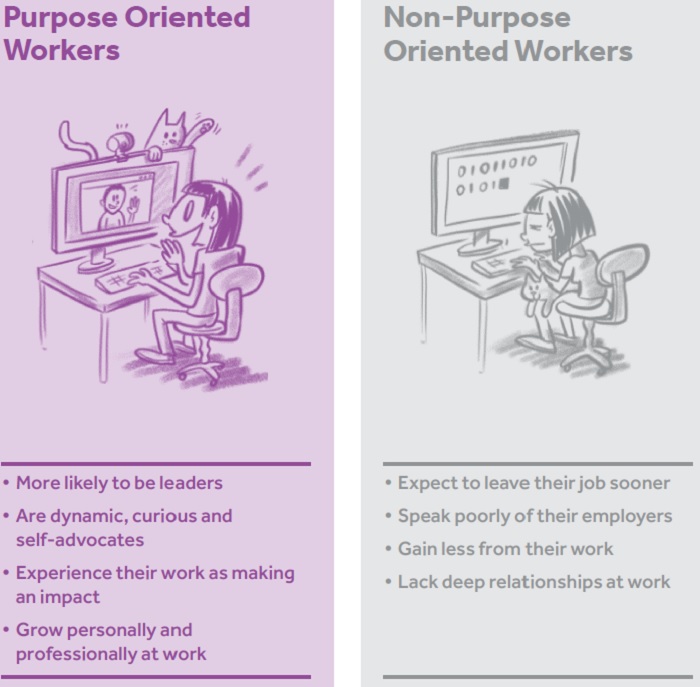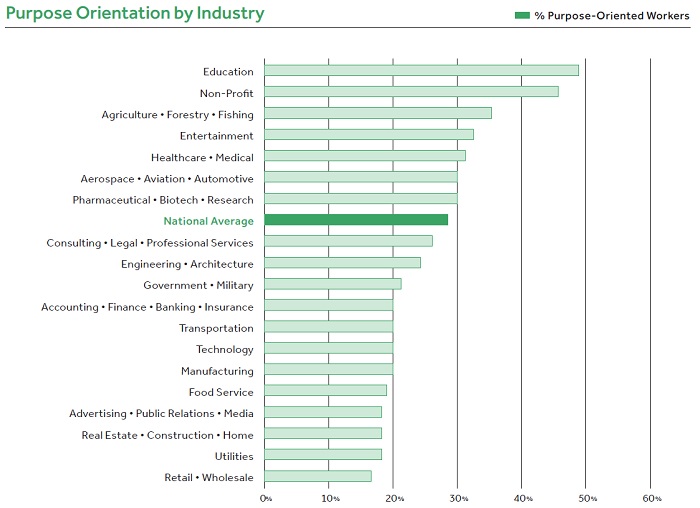How do 28% of the 150 million-strong US workforce primarily define the role of work in their lives? The answer: a source of personal fulfilment and a way to help others.
These are purpose-oriented workers. You may not have heard of them. Yet new research from Imperative and New York University suggests these workers are consistently the most valued in the workforce.
Just what is work orientation anyway?
Research shows we are wired to see work in one of two ways: about status, advancement and income or about personal fulfillment and serving others.
People tend to consistently identify with one over the other which makes work orientation a fascinating measure – it’s a consistent variable unaffected by demographic or environmental factors. It is not contextual. It is a fundamental part of their make-up.
Unlike measures such as employee engagement, work orientation is a predictor of future behaviour and performance.
Purpose-oriented workers and performance
The report suggests that purpose-oriented workers exhibit stronger performance in many areas:
- Expected to stay more than two years: 79% purpose-oriented, 69% non-purpose-oriented
- Likely to be ‘detractors’ in Net Promoter Score surveys: 23% purpose-oriented, 41% non-purpose-oriented
- Experience high levels of fulfilment at work: 46% purpose-oriented, 28% non-purpose-oriented
- Have meaningful relationships at work: 68% purpose-oriented, 45% non-purpose-oriented
- Believe their work makes an impact: 77% purpose-oriented, 50% non-purpose oriented

In which industries are purpose-oriented workers likely to be found?
The survey found that every industry has at least 16% purpose-oriented workers and no industry had more than 48% purpose-oriented workers.
The four industries with the highest purpose-oriented workers are:
- Education
- Non-profits
- Agriculture/Forestry/Fishing
- Entertainment
What jobs are likely to be undertaken by purpose-oriented individuals?
Highest proportion of purpose-oriented individuals:
- Artists/Entertainers
- Professionals
- Service workers
Lowest proportion of purpose-oriented individuals:
- Labourers
- Operators
- Technicians/Repair Workers
More detail can be found in the report from Imperative and New York University.
The individual benefits of being purpose-oriented
- Purpose-oriented workers do not make a financial sacrifice by not being as money-driven as their counterparts. In fact, they are paid the same.
- In terms of education, when controlled for income and age, purpose-oriented workers are still more likely to be more highly educated than their peers.
Attracting purpose-oriented workers by becoming a Purpose Employer
Organisations can take many steps to become more attractive to purpose-oriented workers:
- Hire with PURPOSE: You should optimise recruitment to hire more purpose-oriented workers – this may involve significant changes to employer branding
- Promote on PURPOSE: Purpose-oriented workers tend to display the abilities employers value when looking at succession planning. You should promote leaders that role model purpose-oriented behaviours
- Replace employee engagement: Engagement implies work is undesirable and that we must ‘make it’ engaging. Employers need to look more closely at fulfilment levels and use these to create better partnerships with workers.
- Job design: Employees should be encouraged to tailor their work and tasks to build strong relationships, make meaningful impact and allow themselves to grow professionally and personally











